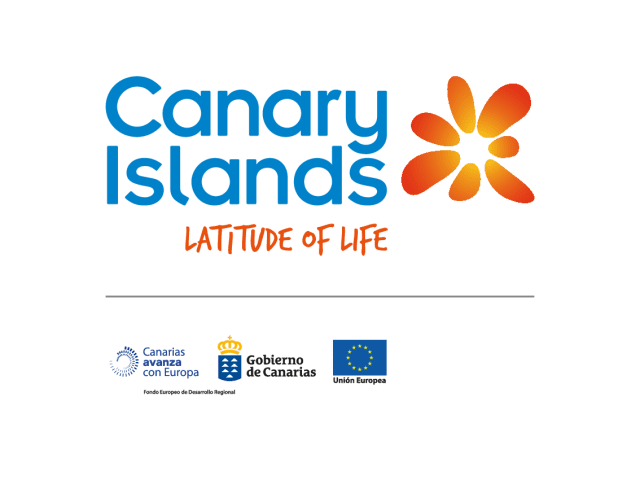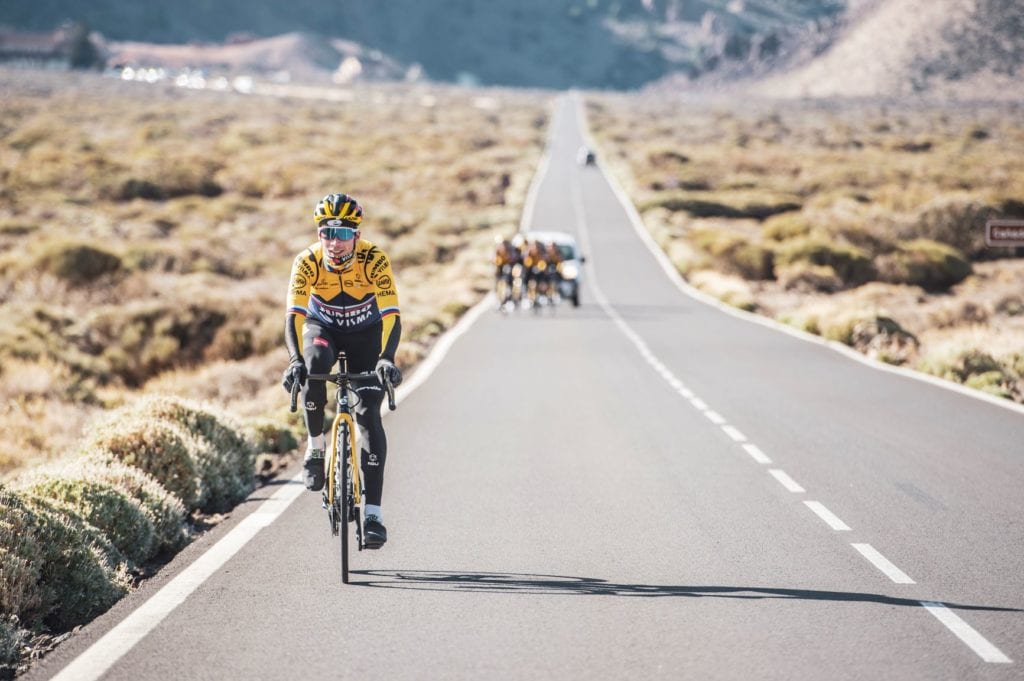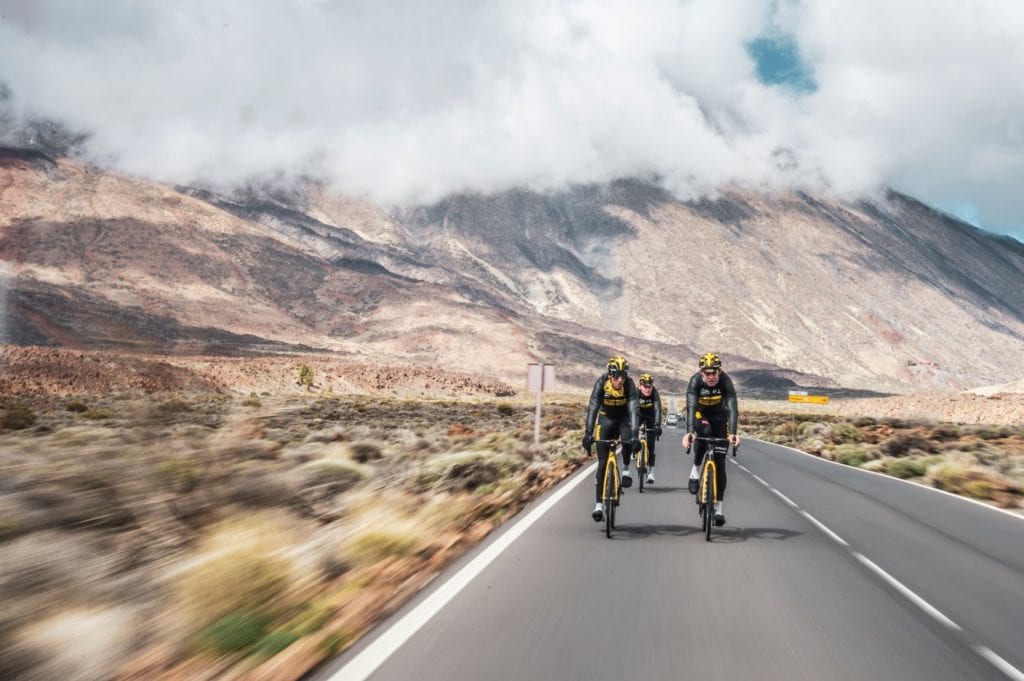“It’s the perfect combination for cyclists. Tenerife has many inclines, very good roads and an exceptional climate. It is the only place where we can do training camps at altitude in good conditions. Here you can go from more than 2,000 meters above sea level to sea level in a very short period of time. And that’s very positive for us,”
– Slovenian Primoz Roglic, the world’s best cyclist in 2020 and double winner of the Vuelta a España, preparing for the season in the Canary Islands.
Team Jumbo-Visma, the best cycling team of 2020, has once again chosen Tenerife for its high-altitude training camps, vital for preparing for the key cycling events around the world. “The main reasons why we chose Tenerife to prepare for the main races of the season are: the climate, the altitude and the long climbs,” says Mathieu Heijboer, Team Jumbo-Visma’s performance manager. It is within this framework that Canary Islands Tourism has decided to join forces with the Netherlands team as part of its Professional Sports Tourism strategy.
“The Canary Islands is a top professional sports tourism destination and this cooperation with the best cycling team in the world in 2020 is a clear sign of our commitment to this long-stay, high-spending segment, which will allow us to compete in the market with less dependence on connectivity,” said Yaiza Castilla, Minister of Tourism, Industry and Trade of the Canary Islands Government.
José Juan Lorenzo, Managing Director of Canary Islands Tourism, explains “It is an honor for us to work with Team Jumbo-Visma, to join forces with the best cyclists in the world today. The Canary Islands have always been a reference for elite cyclists as they have all the necessary conditions for the professionals, and all the technical teams that accompany them, to maximize their training.”
The Canary Islands are the best destination for high altitude training. In fact, cyclists come six or seven times a year to train, since there are no other places with the conditions of the islands. This is supported by members of Team Jubo-Visma. “There is no better place in the world to prepare for altitude. The best teams in the peloton battle every year to prepare their riders in the archipelago, especially in Tenerife,” says Jon Iriberri, head of biomechanics for the Dutch team.
Unique Conditions
With a lower proportion of oxygen, the weather conditions in Teide National Park, Tenerife, offer the perfect environment and an ideal destination for these professional cyclists. There are few places on the planet where you can climb in such a short period of time from sea level to more than 2,000 meters above sea level. Training at over 2,500 meters provides ideal conditions for working on endurance capacity.
“Mountains with the same characteristics as Teide are either snow-capped or the temperatures on their summits are extremely high,” explains Iriberri. “Training at altitude will allow us to carry more oxygen when we return to sea level and in the end that boils down to better performance,” says Tim Heemskerk, TJV trainer.
When it comes to climate, the Canary Islands boast an average of 23º in summer, 19º in winter and 4,800 hours of daylight per year. According to Wout Van Aert, one of the best classic riders in the World Tour peloton, “the Canary Islands is one of the few locations where you can train in good weather at certain times of the year.” Teammate George Bennet adds, “There aren’t many places in the world where you can find so many inclines, such good weather and quiet roads to ride on. Everything is perfect. In addition, there is also a supply of high-rise accommodation, which is not so evident in other destinations.”
One of the riders who has recently made the most of his training camps in the Canary Islands has been Chris Froome, winner of four Tours de France, two Vueltas a España and a Giro d’Italia. The Briton, who made recurring visits to Tenerife when he competed with Sky (later Ineos), was clear about what he liked about his stay in the archipelago. “When I started coming, I felt like we were on the moon. There was nothing else but the hotel, but it was perfect as it was. With these training blocks you have to isolate yourself from the rest of the world. Also, there are thousands of roads and many of those options are wild,” Froome explained to the BBC.
When the sun goes down in the Canary Islands, cyclists achieve that haven of peace they need so much. “Part of the best thing about the mountain is the peace it conveys, the views, the horizon. It is very relaxing” says Spanish cycling legend Perico Delgado.
“If we don’t book a couple of years in advance, or change the dates we want to come, we simply can’t get into the hotel, because it’s too busy with rival outfits,” Tim Kerrison, Chris Froome’s coach on the Ineos team, told the BBC about his experience on Teide. “There are teams that have rooms booked year-round,” Delgado admits.
The Canary Islands – Top Sports Destination
The natural conditions of the Canary Islands make the archipelago a paradise for professional training and active sports, offering sunny days, trade winds, several hours of daylight, as well as the opportunity to continue training at high level accommodation and sports facilities around the islands. In addition to cyclists, many other elite athletes choose the Canaries as their training base, including triathletes, swimmers, paragliders, sailors, beach volleyball players from all over the world.
The connectivity of the Canaries, even now, allows athletes to reach the archipelago from Ireland in approx. four hours. The islands have 1,500km of coastline washed by volcanic waters rich in nutrients and suitable for thalassotherapy, perfect for helping athletes with a quick recovery.
In 2021, the Ministry of Tourism, Industry and Trade of the Canary Islands Government drew up an action plan to position the archipelago as the best destination for professional training. “Tourists who travel to practice sports, always looks for facilities to reach the destination, good sports facilities, complementary activities, a good climate…. And there is no doubt that the Canary Islands are well positioned as a professional sports tourism destination,” explains Nicole Kalemba, PhD in Economics and Business and a specialist in sports tourism.



